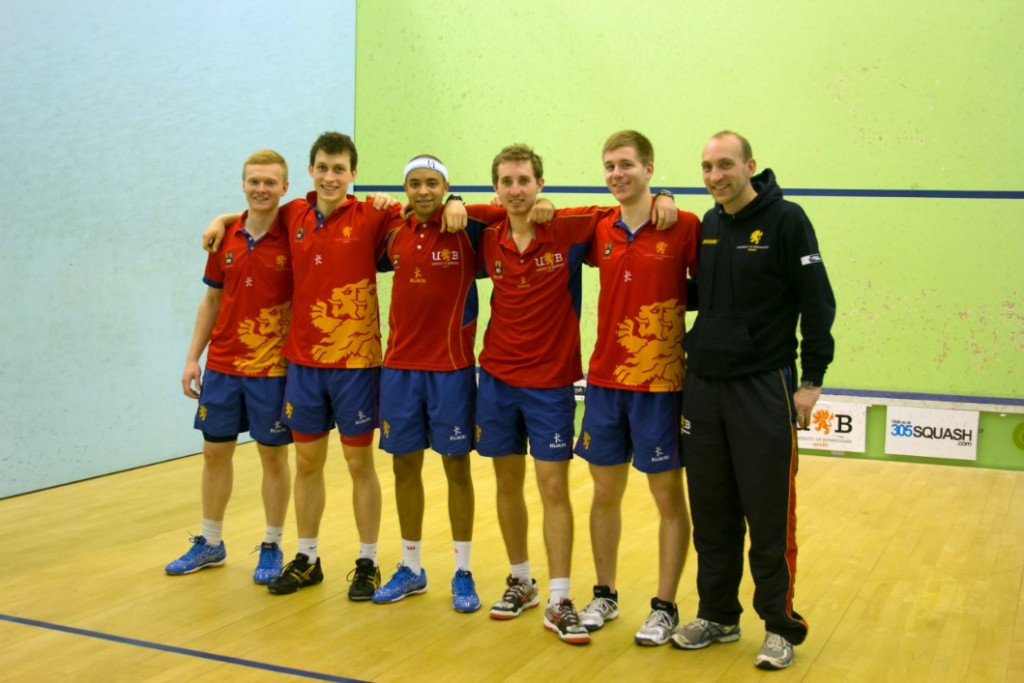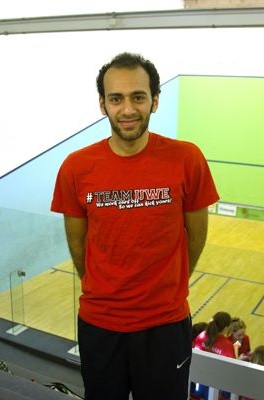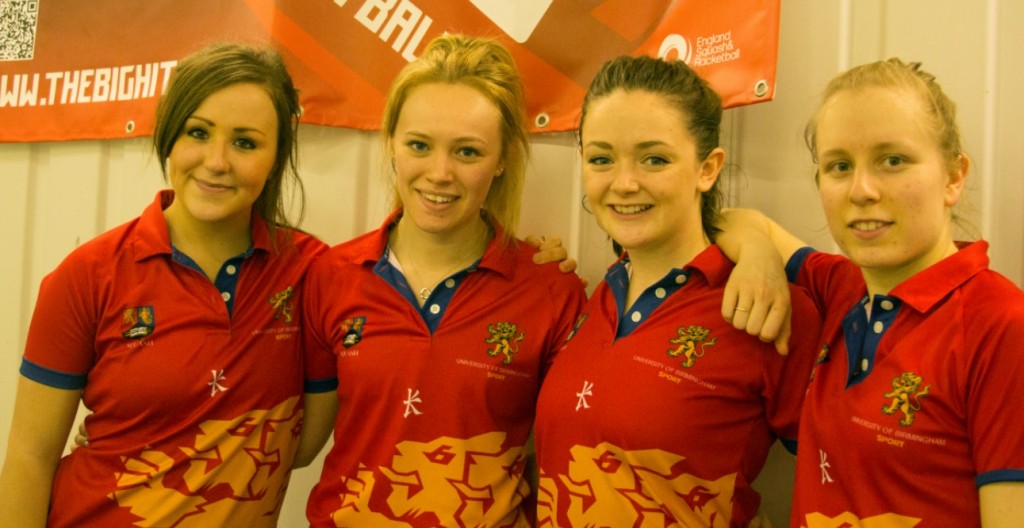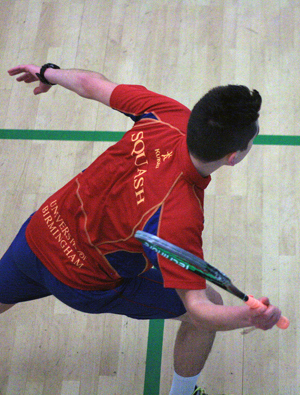By Theo Woodward
College squash in the United States is a hugely successful enterprise that has fueled the development of American squash. In contrast, the situation overseas is the opposite: college squash is more of an after-thought, not a catalyst.
In Great Britain, the intercollegiate squash dates back to 1925 when Oxford and Cambridge’s men began playing each other in the so-called Varsity Match. In 1949 a men’s national intercollegiate championship was started; the women came in 1961 (four years before the U.S. started one). Both were won in their first year by the University of Birmingham.
Today, all intercollegiate squash competition is overseen by British University and Colleges Sport (BUCS). There are thirty-eight men’s and women’s BUCS squash leagues, with four to eight teams in each league; men’s squads have five players and women’s have four. Unlike U.S. squash, each school can enter as many teams as they wish. For example, the University of Nottingham supports five men’s and four women’s teams. Thus, this past winter eighty-six institutions fielded a total of 203 men’s and ninety-three women’s teams.

In addition to team competition, BUCS also runs an individual championship, which draws 300 participants. “Entries for the individual championships have almost doubled over the last five years,” said Zena Wooldridge, Director of Sport at the University of Birmingham. “It’s now challenging to find a combination of venues to accommodate the demand.”
The quality of competition has also increased. Last year, the top four men’s seeds were all ranked in the top one hundred in the world, with then No. 5 Mohamed Elshorbagy earning his fourth consecutive championship. Former professional players who have gone to college in the U.K. include Vanessa Atkinson, Jenny Tranfield Denyer, Becky Botwright, Peter Marshall, Martin Heath, Alex Gough, Joey Barrington, Chris Ryder, Phillip Barker and Ben Garner; current professional players include Sarah Jane-Perry, Emma Beddoes, Daryl Selby, Saurav Ghosal and Steve Coppinger.

Elshorbagy has won five consecutive BUCS individual titles.
The University of Birmingham has consistently fielded the U.K.’s most successful squash program, winning a total of twenty men’s and twelve women’s titles overall since 1949, including both titles in 2014. Birmingham also became the first British university to employ a full-time coach, beginning in 2004.
Unlike Ivy League schools, British programs offer scholarships to entice athletes. This strategy paid off for Leeds Metropolitan University, which lured Vanessa Atkinson to Leeds and went on to win five consecutive women’s championships. The University of West of England (UWE) team boasts a scholarship-supported international line-up including the Elshorbagy brothers and Lucas Serme.
Surprisingly, while UWE won the championship in 2012 they did not make the finals last year or this year, illustrating an important problem in British college squash. Unlike U.S. college squash programs, U.K. schools do not restrict team members from participating in professional tournaments, so top players may skip school squash matches for professional tournaments. At UWE, the top three players often missed crucial BUCS matches because they were all playing PSA events.
British programs are beginning to follow the American model, especially in the area of recruitment. “Birmingham goes for active recruitment through the UCAS (admissions) files, tapping into advanced knowledge of who is going to university in the squash world,” said Richard O’Connor, who coached the 2013 title-winning Nottingham men’s team. “We will try the same trick next year.”
Many other countries have some level of collegiate squash competition. In South Africa, colleges depend primarily on part-time coaches and local club leagues. An annual intercollegiate team championship, started in 1946 for men and 1955 for women, occurs in July with no individual competition. In the 2013 championship, eleven universities fielded a total of seventeen teams. The travel distances and variation in team strength are too great to consider a national league similar to the U.K. or U.S. models. In addition, some colleges compete against each other during one annual all-sport event weekend.
In Australia, squash is part of the annual Australian University Games held since 1993, with ten men’s teams and four women’s teams competing last year. There is no individual competition. In New Zealand, squash was previously represented in the annual national University Games competition, but it was recently dropped from the program. This year, New Zealand is bringing back its U23 national championships, hoping to include a collegiate section to fill the gap.

India offers an annual intercollegiate team and individual championship but lacks strong competition at the collegiate level. College squash is seen as an individual sport with very little input from universities. In Hong Kong, there is a team championship; nine universities competed in both the men and women’s sections this year
France’s collegiate system has little provision for collegiate squash. The French hold an annual university championship, which attracts eight to ten teams, and an individual event although this offers little competition. There is also the more competitive “Coupe de France des Grandes Ecoles,” where the large universities play in an annual team and individual event; nineteen teams played in 2014. Interestingly it is open to students and graduates who graduated less than five years before the event—thus, Thierry Lincou and Renan Lavinge played in 2012 and 2013 respectively.
Canada hosts the Ontario University Athletics (OUA) Championships. The OUA’s first recorded championship was held in 1951 for men and 1978 for women. The University of Western Ontario (UWO) has won the men’s competition for the last thirty-one consecutive years. UWO women have also dominated, with fourteen titles in all, although they finished second to Toronto this year. Western boasts a unique squash program with a full-time coach, which is unusual for Canadian squash. In addition, there is a Canadian university individual championships held each year; last year’s event attracted eighty entrants.
In Egypt, there is no inter-collegiate competition, despite the fact that virtually all of their touring professionals attend university.
In 1996 the World Squash Federation launched the biennial World University Squash Championship. There is both a team (two men and one woman per side) and individual competition. Despite having the oldest and largest collegiate system, the U.S. has only medaled twice at the WUSC, with Todd Harrity grabbing a bronze in the men’s individual and the American team beating Canada to win a bronze in 2010 in Melbourne. The eighth WUSC will be in Chennai, India, in September.


